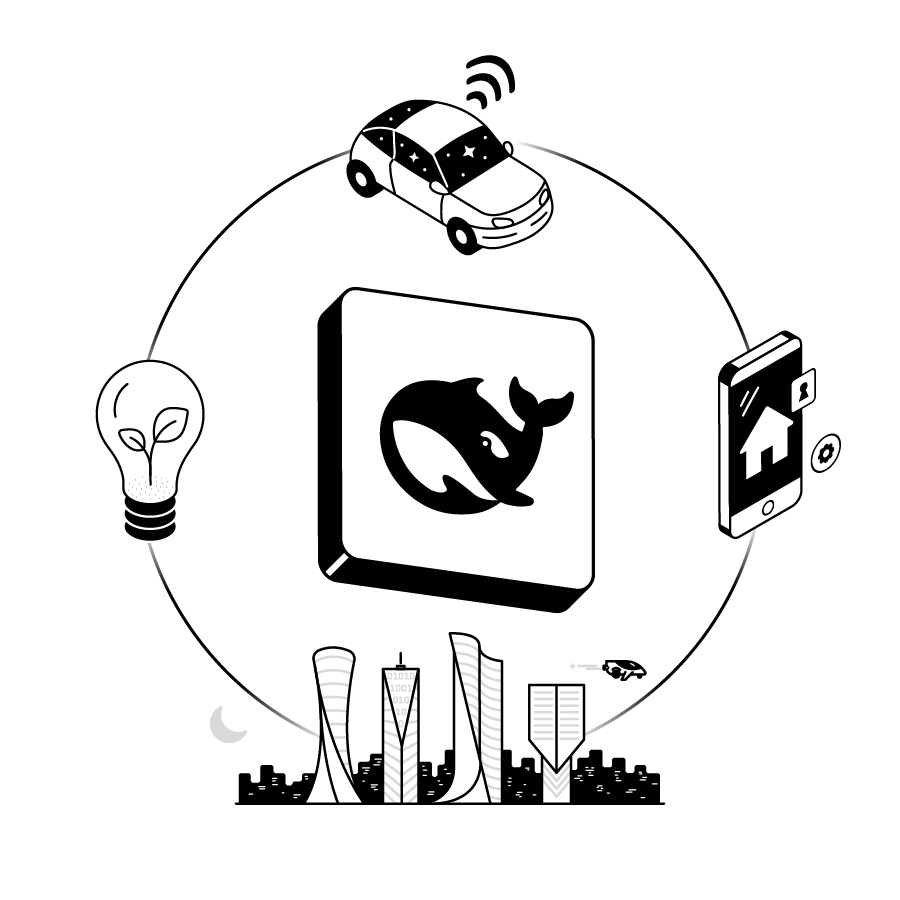DeepSeek, a Chinese AI model that matches the best U.S. models, such as ChatGPT, Gemini, Claude, Mistral & LLaMA showing that China is no longer just catching up but actively competing at the highest level.
This AI battle isn't just about technology; it's about global influence, economic power, and security concerns. Both countries are taking strategic steps to strengthen their AI capabilities. As China pushes forward with massive government support and strategic investments, the U.S. is responding with defensive policies, tighter restrictions, and efforts to maintain its edge. The question now is: where does this race lead?
China’s Strategic AI Play
China has set an ambitious goal: to become the world leader in artificial intelligence by 2030. The government has poured billions into research, supporting both tech giants like Baidu, Tencent, and Alibaba and a wave of promising startups. This aggressive strategy is fueling rapid progress.
DeepSeek, a product of this push, demonstrates that Chinese AI models can now rival top-tier U.S. models like OpenAI’s GPT-4. But this success isn’t just about talent - it’s about creating the right conditions to grow.
Why China Is Advancing Rapidly:
- Massive Government Investment – China’s AI strategy is backed by national policies, research grants, and infrastructure development.
- Tech Giants and Startups – Big players like Alibaba and Baidu are developing their own AI models while startups drive innovation.
- Data Advantage – With a massive population and more flexible data privacy laws, China has access to vast amounts of data to train AI models.
- AI Talent Recruitment – China is aggressively hiring top AI talent worldwide while investing in education to develop a strong domestic workforce.
DeepSeek’s success is just one step in China’s long-term strategy.If China continues this momentum, it could soon surpass the U.S. in key areas of AI research and application.

The U.S. Response: Playing Defense and Staying Competitive
The U.S. is taking measures to protect its AI leadership. Rather than solely competing on investment, the U.S. has focused on restrictions and security measures to maintain its technological advantage. Key U.S. Strategies to Maintain AI Dominance:
- Export Controls – The U.S. has restricted the export of advanced AI chips to China, aiming to limit its ability to train large-scale AI models.
- National Security Efforts – The Federal Communications Commission (FCC) has established a security council to counter cyber threats and protect AI-related technologies.
- Public-Private Collaboration – The U.S. is working closely with AI leaders like OpenAI, Google DeepMind, and Anthropic to ensure that its AI development remains ahead.
- Increased AI Investment – Funding for AI R&D has grown through agencies like the National Science Foundation and the Department of Defense.
- Government Device Restrictions – The U.S. has banned certain AI models, including DeepSeek, from use on government devices due to security concerns.
While these strategies aim to slow China’s progress, they also highlight a fundamental difference in approach: China is expanding aggressively, while the U.S. is focusing on security and strategic innovation.
The “AI Cold War” and Its Implications
Some experts now see this as an "AI Cold War" - a high-stakes competition where AI dominance translates into global influence. But this isn’t just about which country can build the most advanced chatbot or image generator. The implications go much deeper.
Why AI Leadership Matters:
- Military and Cybersecurity – AI is increasingly being integrated into defense systems, cybersecurity, and even autonomous weapons. The country with the best AI could gain a military edge.
- Economic Power – AI-driven automation and innovation are reshaping industries. The future global economy will favor the nation that leads in AI development.
- Ethical and Regulatory Influence – The U.S. and China have very different approaches to AI governance. Whoever sets the global AI standards will shape its worldwide use.
This AI race isn’t just about innovation - it’s about shaping the world order.

The Hidden Challenges of AI Integration
Despite rapid advancements, AI infrastructure isn’t perfect. Many companies investing in AI face hidden challenges that slow down progress.
At first glance, cloud security and automation tools seem like a great deal - offering per-project or per-resource pricing that looks cost-effective. But in reality, this model forces companies into a shared environment to keep costs down, leading to security risks and inefficiencies.
Common AI Integration Challenges:
- Security Vulnerabilities – A single misconfiguration or stolen credential can expose sensitive data.
- Complex AI Tool Integration – Many AI tools don’t work seamlessly together, leading to inefficiencies and compatibility issues.
- Scalability Issues – AI infrastructure needs constant updates, but fragmented tools slow down progress.
- Rising Costs – The price of maintaining AI infrastructure often exceeds initial expectations.
For AI to truly reach its potential, companies need better integration, stronger security, and cost-effective solutions.
The Future of the AI Race
DeepSeek’s emergence signals a turning point, proving that China is not just competing but excelling in AI. The U.S. response - while focused on security and restrictions - must also prioritize aggressive innovation if it wants to maintain its lead.
As both countries invest heavily in AI, the global community must navigate the opportunities and risks of this evolving landscape. One thing is certain: the AI race is far from over, and its outcome will define the next era of technological and geopolitical power.
Sources:
https://www.lowyinstitute.org/the-interpreter/ai-china-us-go-head-head
https://www.wilsoncenter.org/article/americas-ai-strategy-playing-defense-while-china-plays-win
https://time.com/7204164/china-ai-advances-chips/
https://www.orfonline.org/expert-speak/deepseek-and-the-shifting-tides-of-the-us-china-ai-race
https://www.bbc.com/news/articles/czepw096wy4o
https://www.voanews.com/a/china-boosting-development-of-ai-for-use-in-trade-war-with-us/8007739.html
https://www.ncuscr.org/podcast/us-china-ai-race/
Hashtags:
#AI #ArtificialIntelligence #TechTrends #AIInnovation #MachineLearning #DeepLearning #ChinaAI #USAvsChina #AICompetition #Geopolitics #FutureOfAI #AIResearch #TechNews #EmergingTech #AIInfrastructure #AIRegulation #CloudSecurity #DigitalTransformation #AILeadership #GlobalTech #AIWar #Technology
Written by Shihari Chandrasekara
Shihari is a Business Analyst at Pvotal Technologies. Enjoys exploring new technologies and finding ways to help businesses maximize their potential.
